Ministry of New and Renewable Energy
Achieving Universal Energy Access by 2030, as outlined in Sustainable Development Goal 7, requires Increased Efforts on Solar Mini-grids
Roadmap for Promoting Solar Energy for Universal Energy Access Released, at 4th G20 Energy Transition Working Group Side Event
Posted On:
20 JUL 2023 7:55PM by PIB Delhi
Goa, 20th July, 2023
At a side-event of the 4th Energy Transition Working Group in Goa today, the Ministry of New and Renewable Energy (MNRE), Government of India, in association with the International Solar Alliance, released a Roadmap of Solar Energy for Universal Energy Access. A workshop and panel discussion were also held, where energy access issues and solutions were deliberated upon. The workshop and panel discussion can be watched here.
“Solar has emerged as technology of choice in energy transition”
Addressing the workshop, Mr. Bhupinder Singh Bhalla, Secretary, Ministry of New and Renewable Energy, Government of India highlighted: “The challenge to provide Universal Energy Access cuts across other global energy transition issues and hence, unless we make rapid strides towards providing reliable, sustainable, and affordable energy access to all, our progress in other areas will get hampered. India has made ambitious commitments as part of our transition towards clean energy. We are planning to achieve 50 percent cumulative electric power installed capacity from non-fossil fuel-based energy resources by 2030. Although a wide variety of renewable technologies are available, each with their unique advantages, solar energy in particular has emerged as the technology of choice that can play a key role in driving energy access, energy security and energy transition. Through this report on ‘Roadmap of Solar Energy for Universal Energy Access’, developed under India’s G20 presidency in 2023, we aim to showcase how solar energy, in its various configurations, can play a key role in achieving electricity access and in providing socio-economic benefits in countries around the world.”
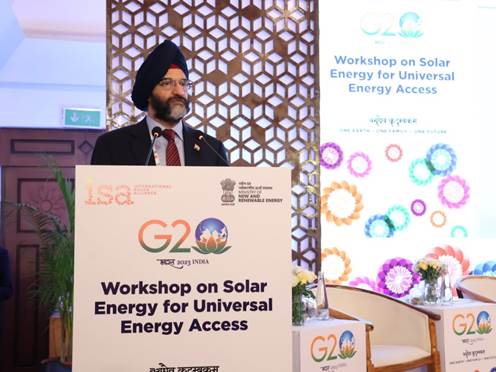
“Electrification approaches centred on solar energy key to address energy access challenges”
Dr. Ajay Mathur, Director General, International Solar Alliance noted: “9% of the global population still lack access to electricity. If the current growth rate continues, approximately 660 million people, accounting for 8% of the global population, will still be without electricity by 2030. Additionally, over 1.9 billion people will need clean cooking access by 2030. Sub-Saharan Africa and rural areas face the most acute energy access challenges. Solar energy combined with battery storage is emerging as the optimal choice for electrification, especially in places which are at a distance away from the grid. It offers technical, financial, and social benefits. A combination of electrification approaches centred on solar energy can be deployed to address energy access challenges in different situations.”
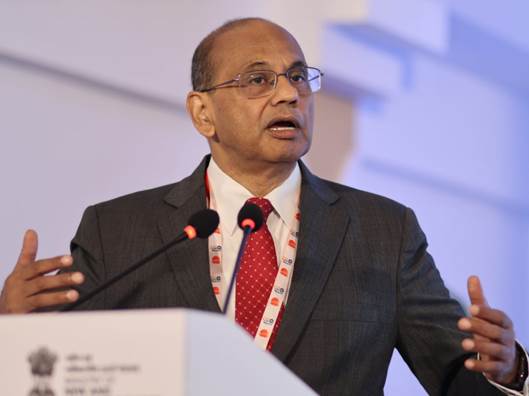
“Decentralised solar mini-grids can be supported through Feed-in Tariffs and tariff restructuring”
Mr. Puneet Kumar Goel, Chief Secretary, Government of Goa, observed: “The use of diesel generators, particularly in remote regions or islands, results in significantly high cost of electricity of upto Rs. 36 per unit due to high cost of fuel due to transportation costs. Solar energy has been able to provide electricity to such regions even during natural disasters, and has seen significant cost reductions as well. India has set ambitious targets for decentralised solar, and their deployment can be supported through the use of Feed-in Tariffs and tariff restructuring for grid connected decentralised solar capacity. Additionally, battery costs are expected to come down with large scale procurement, further supporting the development of solar mini-grids. Such mini-grids can also see improved reliability and reduced power equipment costs through hybridisation of solar with wind or biomass energy. However, equipment manufacturing at scale, alongside capacity for on-ground execution and operations and maintenance, remain as bottlenecks that must be addressed.”
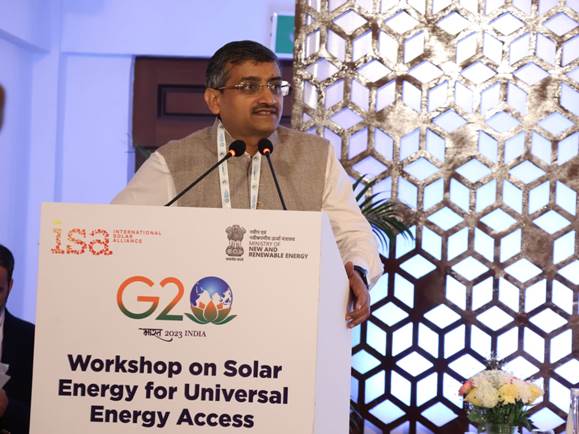
“Solar can meet energy needs of remotest and most vulnerable populations”
Ms. Damilola Ogunbiyi, CEO and Special Representative of the UN Secretary-General for Sustainable Energy for All (SEforALL) and Co-Chair of UN Energy, observed, “Solar energy can pave the way for true South – South collaboration to bring developmental benefits to both Africa and India. Cumulative solar capacity is expected to reach around 2050 GW by 2027. Additionally, Solar can meet the energy needs of the remotest and most vulnerable populations, and provide last mile energy access. However, there remain two major enabling areas to be addressed with significant potential for impact. Firstly, there is a need for a massive and equitable scale up of investments in the sector across various countries. Secondly, there is a need to address the lack of enabling policies and regulations that can support the deployment of solar energy for universal energy access.”
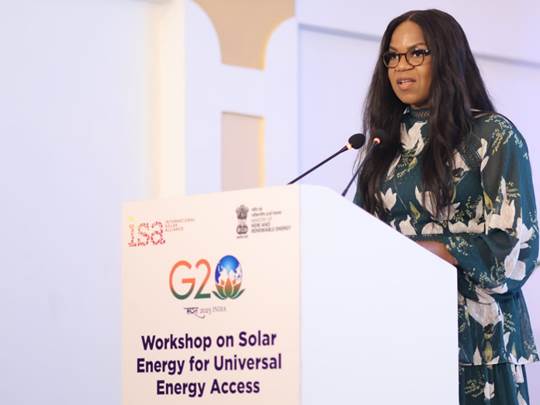
“Investment of 192 billion US Dollars Required for Providing Energy to Unelectrified Population”
Based on the analysis done by the International Solar Alliance in the Roadmap of Solar Energy for Universal Energy Access released today, around 59% (396 million people) of the unelectrified population can be best suited for electrification through solar-based mini-grids, about 30% (203 million people) through grid extensions and the remaining 11% (77 million people) through Decentralized Renewable Energy solutions. To achieve this, a total investment of around USD 192 billion will be required, comprising: USD 97 billion in Solar-based mini-grids for approximately 25,738 MW of capacity; USD 18 billion in Solar-based decentralised renewable energy (DRE) solutions for about 1,224 MW of capacity; and USD 78 billion in Grid Extensions for the required infrastructure.
Considering viability gap funding of 50% of project costs, financial support of around USD 48.5 billion will be needed to achieve the required mini-grid deployment. Through increased investments, ecosystem development initiatives, focused interventions, optimal use of resources, and solar PV-based cooking solutions integration with electrification initiatives, the world can accelerate into a fast-paced development scenario to achieve universal energy access by 2030.
The Roadmap further states that while the technology solutions necessary for achieving energy access are available, several challenges must be addressed to sustainably scale up the deployment of these solutions. While countries widely recognize the necessity for policies and regulations, progress in this area still needs to be made, according to the report. As a result, private sector participants and local entrepreneurs are hesitant to engage in energy access projects. Intergovernmental organisations can play an instrumental role here by assisting access-deficit countries in developing policy and regulatory frameworks that create an enabling environment for interventions.
Most of the population facing energy access deficit resides in underdeveloped regions where consumers struggle to afford electricity. High financial risks in these regions increase project costs for developers, widening the gap between consumer affordability and supplier viability. Risk mitigation measures and concessional financing can attract private-sector investment to energy access projects, facilitating scalability and sustainability.
Another aspect predominant in energy access-deficit countries is often the need for more technical and financial expertise to drive electrification initiatives. They require skill development activities, access to global best practices, and programmes to support sectoral entrepreneurs. Training and capacity building, entrepreneurial support, and awareness creation in energy access-deficit countries are vital for long-term progress.
To accomplish the necessary mini-grid deployment, approximately USD 48.5 billion in financial support is required, representing 50% of the project costs. By increasing investments, fostering ecosystem development initiatives, implementing focused interventions, making optimal use of resources, and integrating solar PV-based cooking solutions with electrification initiatives, the world can accelerate into a fast-paced development scenario, ultimately achieving universal energy access by 2030, says the report. Check out the Roadmap of Solar Energy for Universal Energy Access here.
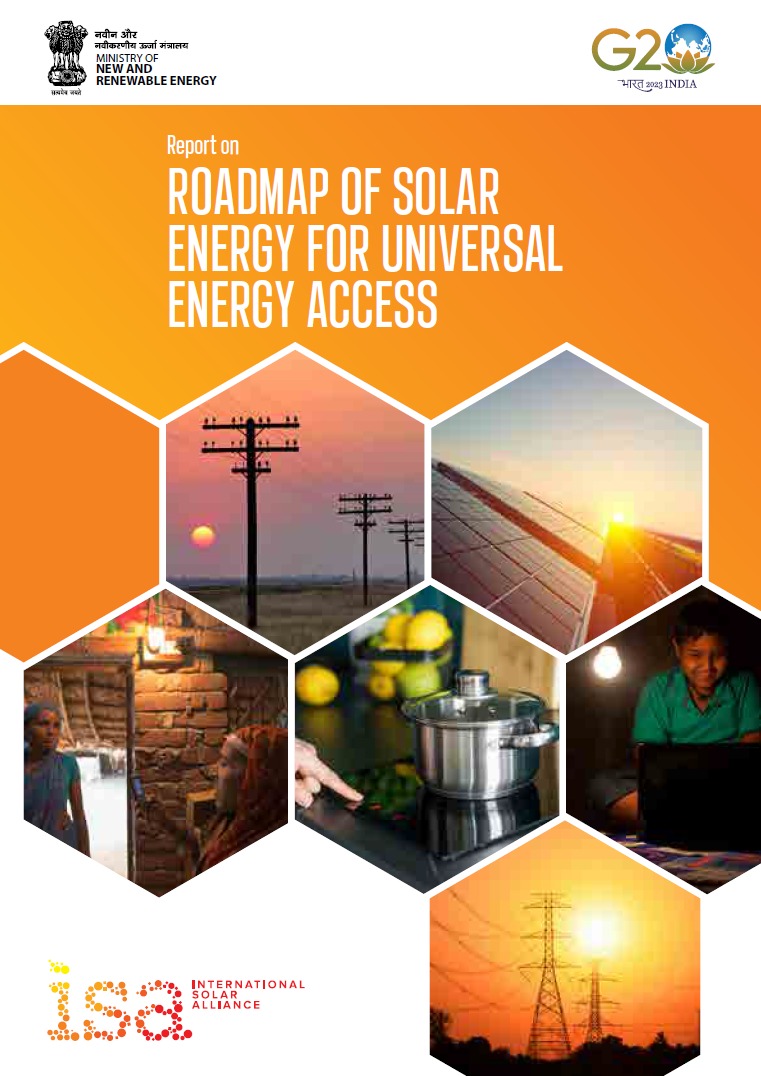
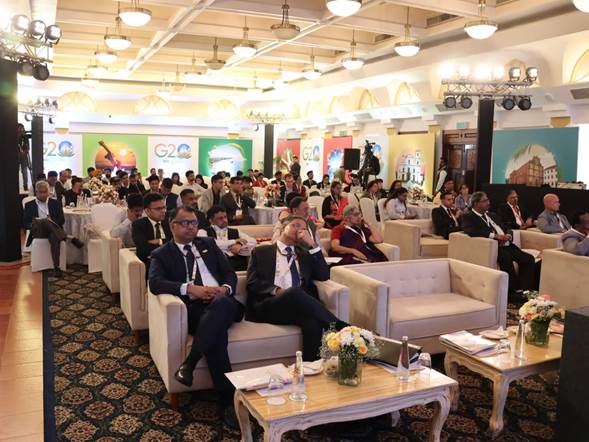
About International Solar Alliance: The International Solar Alliance is an international organisation with 116 Member and Signatory countries. It works with governments to ease solar deployment and promote solar power as a sustainable transition to a carbon-neutral future. ISA’s mission is to unlock US$ 1 trillion of investments in solar by 2030 while reducing technology and its financing costs. It promotes the use of solar energy in the agriculture, health, transport, and power generation sectors. ISA Member Countries are driving change by enacting policies and regulations, sharing best practices, agreeing on common standards, and mobilising investments. Through this work, ISA has identified and designed and tested new business models for solar projects; supported governments to make their energy legislation and policies solar-friendly through Ease of Doing Solar analytics and advisory; pooled demand for solar technology from different countries; and drove down costs; improved access to finance by reducing the risks and making the sector more attractive to private investment; increased access to solar training, data and insights for solar engineers and energy policymakers. ISA is one of the first international intergovernmental organisations headquartered in India. It is partnering with multilateral development banks (MDBs), development financial institutions (DFIs), private and public sector organisations, civil society, and other international institutions to deploy cost-effective and transformational solutions through solar energy, especially in the Least Developed Countries (LDCs) and the Small Island Developing States (SIDS). More information at https://isolaralliance.org/
***
PIB DELHI / GOA | AM / GSK / DJM
(Release ID: 1941211)
Visitor Counter : 4808